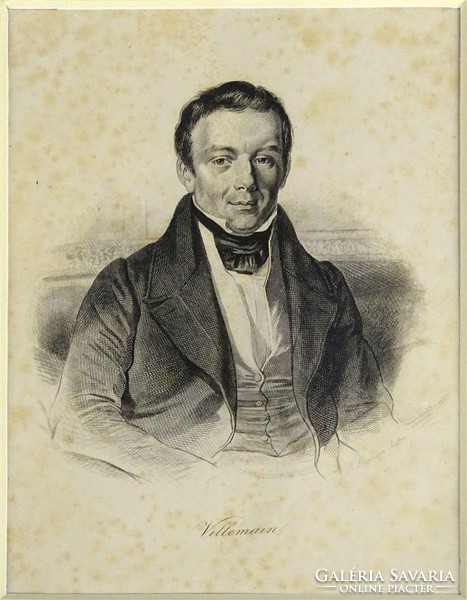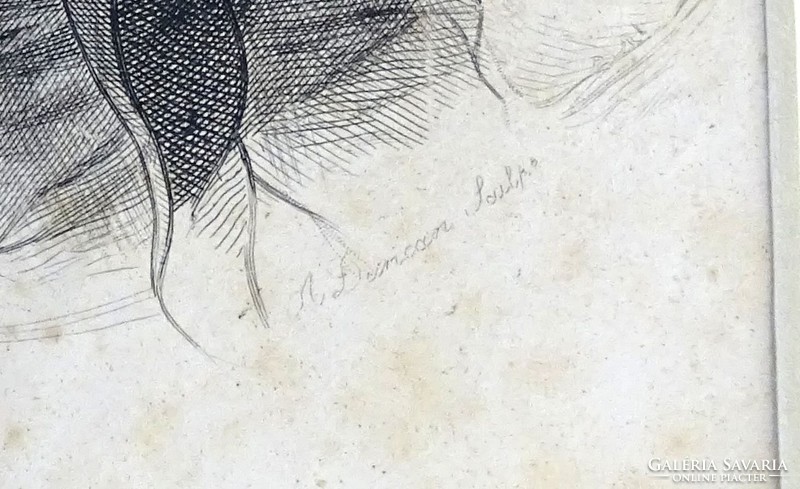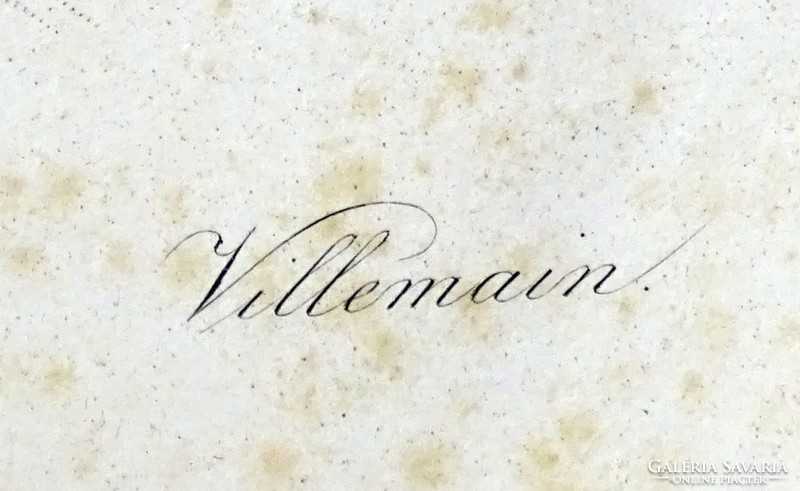0I862 Antik acélmetszet VILLEMAIN
| Feltöltés ideje: 2023. december 04. |
| Termékkód: 1364531 |
| Megtekintések: 75 |
| Megfigyelők: 0 |
| Ajánlatok: 0 ajánlat |
antikvitasok (3014)
![]() BUDAPEST
BUDAPEST
Hitelesített felhasználó
Tudja meg, milyen lépésekkel tesszük biztonságosabbá és kényelmesebbé online piacterünk használatát. Részletek
| Téma: | portré |
| Eredetiség: | eredeti |
Szépen keretezett, paszpartuban és üveglap mögött található hibátlan, ajándékozható állapotban lévő jelzett acélmetszet portré.
A képen látható személy:
Abel-François Villemain
Jelzés:
A. DUNCAN sculp
Szélesség: 27 cm
Magasság: 31 cm
Súly: 0.62 kg
Portré mérete: 13 x 16,5 cm.
Abel-François Villemain
From Wikipedia, the free encyclopedia
Abel-François Villemain (9 June 1790 – 8 May 1870) was a French politician and writer.
Biography
Villemain was born in Paris and educated at the Lycée Louis-le-Grand. He became assistant master at the Lycée Charlemagne, and subsequently at the École Normale. In 1812 he gained a prize from the Academy with an essay on Michel de Montaigne. Under the restoration he was appointed, first, assistant professor of modern history, and then professor of French eloquence at the Sorbonne. Here he delivered a series of literary lectures which had an extraordinary effect on his younger contemporaries.[1]
Villemain had the great advantage of coming just before the Romantic movement, of having a wide love of literature without being an extremist. Most of the clever young men of the brilliant generation of 1830 passed under his influence; and, while he pleased the Romanticists by his frank appreciation of the beauties of English, German, Italian, and Spanish poetry, he did not decry the classics—either the classics proper of Greece and Rome or the so-called classics of France.[1]
In 1819 he published a book on Oliver Cromwell, and two years later he was elected to the Academy. Villemain was appointed by the restoration government Chef de l'imprimerie et de la librairie, a post involving a kind of irregular censorship of the press, and afterwards to the office of master of requests. Before the revolution of July he had been deprived of his office for his liberal tendencies, and had been elected deputy for Évreux. Under Louis-Philippe he was made a Peer of France in 1832. He was a member of the council of public instruction, and was twice minister of that department, and he also became secretary of the Academy. During the whole of the July monarchy he was one of the chief dispensers of literary patronage in France, but in his later years his reputation declined. He died in Paris.[1]
His wit was legendary; an anecdote has a fellow professor saying to him "I have discovered a french expression in Cicero." Now this professor had been a revolutionary during the revolution, a follower of Napoleon during the Empire and a royalist during the restauration; Villemain answered quickly to him: "I found one too: «Quantae infidelitates! Quot amicorum fugae!»"[citation needed]
Villemain's chief work is his Cours de la littérature française (5 vols., 1828–1829). Among his other works are: Tableau de la littérature au Moyen Âge (2 vols., 1846); Tableau de la littérature au XVIII siècle (4 vols., 1864); Souvenirs contemporains (2 vols., 1856); Histoire de Grégoire VII (2 vols., 1873; Engl. trans., 1874).[1]
Lautréamont assessed him thus: "Villemain is thirty-four times more intelligent than Eugène Sue and Frédéric Soulié. His preface to the Dictionary of the Academy will outlive the novels of Walter Scott and Fenimore Cooper, and all the novels conceivable and imaginable."[citation needed]
Among notices on Villemain may be cited that of Louis de Loménie (1841), E. Mirecourt (1858), J.L. Dubut (1875). See also Sainte-Beuve, Portraits (1841, vol. iii), and Causeries du lundi (vol. xi, "Notes et pensées").[1]
Forrás: en.wikipedia.org
Garanciális feltételek
| Garancia: örökös |
Fizetési opciók
| Banki előre utalás |
| Készpénz |
| Postai utánvétel |
| PayPal |
Szállítási opciók
| Szállítás innen: Magyarország Feldolgozási idő: 1-2 munkanap A feldolgozási idő megmutatja, hogy az eladónak a fizetéstől számítva mennyi időre van szüksége a tárgy becsomagolásához és feladásához. Ez alapján tájékozódhat a vevő, hogy a fizetést követően mikor várhatja a csomag feladását. | |
| Személyes átvétel | Budapest IX. |
| MPL - csomagautomata | 1650 HUF |
| MPL - házhozszállítás | 1800 HUF |
| PostaPont | 1650 HUF |




